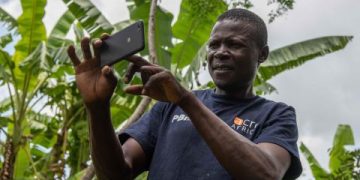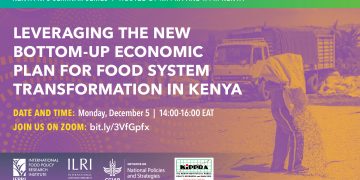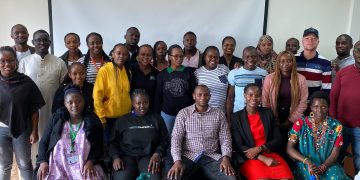BY FRANCISCO CEBALLOS, BERBER KRAMER AND BENJAMIN KIVUVA IFPRI’s picture-based insurance (PBI) initiative, recognized as a CGIAR@50 Innovation and active since 2016, relies on participating farmers to upload smartphone pictures of their fields at intervals throughout the growing season. In the event of bad weather, pests, disease, or other problems that harm the crops, the photos are used to […]
Policy seminar: Leveraging Kenya’s new Bottom-Up Economic Plan for food system transformation
National Treasury and Planning Cabinet Secretary Prof. Njuguna Ndung’u (left) and Ministry of Agriculture and Livestock Development Principal Secretary Kello Harsama discuss Kenya's new Bottom-Up Economic Plan. Kenya’s new government has developed an ambitious Bottom-Up Economic Plan to tackle complex domestic and global challenges. “The Bottom-Up approach is about making sure that markets work, and more […]
Leveraging the New Bottom-Up Economic Plan for Food System Transformation in Kenya- Seminar
Hosted by KIPPRA and IFPRI Kenya DEC 5, 2022 - 2:00 TO 4:00PM EAT This event is part of the Kenya NPS Seminar Series The new Kenyan government faces a complex domestic and global environment. Rapid population growth and urbanization with limited structural transformation present major challenges to Kenya’s ability to achieve food security for all and […]
CGIAR Initiatives, NPS and Foresight, Capacity Sharing Workshops Series on Building Kenya Social Accounting Matrices (SAMs)
International Food Policy Research Institute (IFPRI) kicked off a six-day workshop on September 19, 2022 in Nakuru, Kenya. The workshop aimed to share capacity on Social Accounting Matrices (SAMs), and the standardized toolkit for building SAM. This forms part of Kenya’s Capacity Sharing Workshops Series under the CGIAR Initiatives on National Policies and Strategies (NPS), […]
IFPRI-Kenya training KIPPRA’s Young Professionals (YPs 2021/22 cohort) on Social Accounting Matrices and multiplier analysis.
IFPRI conducts training to KIPPRA’s Young Professionals (YPs 2021/22 cohort) on Social Accounting Matrices and multiplier analysis. The CGIAR Research Initiative National Policies and Strategies (NPS) under the leadership of the International Food Policy Research Institute (IFPRI) has conducted an introductory training on Social Accounting Matrices (SAM) and multiplier analysis for Kenya’s Young professionals. The […]
- « Previous Page
- 1
- …
- 4
- 5
- 6
- 7
- 8
- 9
- Next Page »




